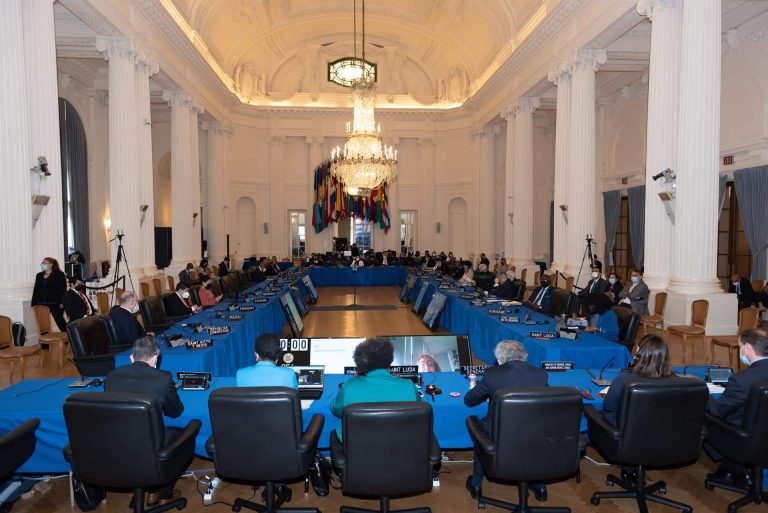11 de agosto 2022

Ortega Grants Chinese Company a Huge Mining Concession

PUBLICIDAD 1M
PUBLICIDAD 4D
PUBLICIDAD 5D
The last time the regional body discussed the Nicaraguan crisis was when it condemned the occupation of its headquarters in Managua

The delegation of Antigua and Barbuda requested the General Secretariat of the Organization of American States (OAS), to hold a special session on Friday, August 12, to analyze the political crisis in Nicaragua.
Antigua and Barbuda’s request was supported by the delegations of Canada, Costa Rica, Chile, Dominican Republic, Peru, United States and Uruguay.
The request was made to address “a draft resolution on the situation in Nicaragua that will be distributed shortly to all the member states” of the regional organization.
The last time the OAS Permanent Council discussed the Nicaraguan crisis was on May 13, 2022, after the Police occupation of the regional body’s office in Managua ordered by Daniel Ortega and Rosario Murillo.
The occupation of the OAS office in Managua occurred on the afternoon of Sunday, April 24, minutes after Foreign Minister Denis Moncada informed the General Secretariat of the regional organization and Nicaraguan society that the Ortega government decided “to cancel and close” the OAS offices in Managua.
On May 13, the Permanent Council approved a resolution condemning the occupation of its offices in Managua and demanding that the State of Nicaragua reinstate them.
The resolution was read by the Permanent Representative of Antigua and Barbuda, Ambassador Michael Sanders, and was supported by 29 delegations, among them: Canada, Brazil, Chile, Colombia, United States, Grenada, Uruguay, Costa Rica, Mexico, and Argentina.
There were no votes against, but the delegations of Saint Vincent and the Grenadines, Honduras and El Salvador abstained from voting. In addition, the delegations of Bolivia and Nicaragua were absent.
The resolution deplored “the violation of the inviolability of the organization’s files,” and stressed that “the immunity of its assets must be fully respected while they remain in Nicaragua” and demanded that the use of the premises seized by the Ortega government be restored. This never happened.
The former ambassador of the Ortega regime to the OAS, Arturo McFields, expressed on Twitter his opinion on this Antigua and Barbuda’s request noting that “human rights are not of the left or the right. We invite President Gustavo Petro to support it.”
The leftist Gustavo Petro was sworn in this Sunday, August 7, as President of Colombia, office to which he will succeed Ivan Duque.
Despite his ideology, Petro has questioned the repression and political violence of the regime of Daniel Ortega and Rosario Murillo. In his first interview as president-elect to the Colombian magazine CAMBIO, he said that in Nicaragua there is an authoritarian drift that has turned into a climate of “repression against opponents and political prisoners.”
What you are saying is that there is no democratic valve to deal with this nonconformity, are we going towards violence? Petro was asked in that interview.
“It explodes. We are seeing it in Ecuador. I cannot get involved too much into that, but there is an explosion there. We saw it in Chile. Chile is processing that in a peaceful and democratic way, but we must see what happens next. In some of these processes there have been anomalies trying to take them to the past. So, there is repression on opponents, political prisoners. Nicaragua, for example. Those imprisoned in Nicaragua, and here I am getting myself again in a jam, are the ones who made the revolution against Somoza,” he answered.
CAMBIO: “And who were comrade-in-arms of Ortega, who now persecutes them…
“And who were our friends and now they are prisoners. And, why? Well, because there are some drifts that are not exactly towards democracy and that must be avoided,” Petro added in the interview.
This article was originally published in Spanish in Confidencial and translated by Havana Times
PUBLICIDAD 3M
Confidencial es un diario digital nicaragüense, de formato multimedia, fundado por Carlos F. Chamorro en junio de 1996. Inició como un semanario impreso y hoy es un medio de referencia regional con información, análisis, entrevistas, perfiles, reportajes e investigaciones sobre Nicaragua, informando desde el exilio por la persecución política de la dictadura de Daniel Ortega y Rosario Murillo.
PUBLICIDAD 3D